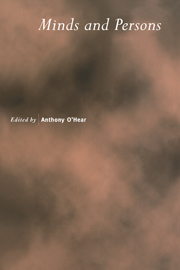Book contents
- Frontmatter
- Contents
- Preface
- Notes on Contributors
- Perceptual, Reflective and Affective Consciousness as Existence?
- The Domain of Folk Psychology
- Minds, Persons and the Unthinkable
- Moderately Massive Modularity
- A Theory of Phenomenal Concepts
- Free Will and the Burden of Proof
- Materialism and the First Person
- Language, Belief and Human Beings
- Human Minds
- Non-Personal Minds
- Personal Agency
- Mental Substances
- Mind and Illusion
- Index
Free Will and the Burden of Proof
Published online by Cambridge University Press: 04 August 2010
- Frontmatter
- Contents
- Preface
- Notes on Contributors
- Perceptual, Reflective and Affective Consciousness as Existence?
- The Domain of Folk Psychology
- Minds, Persons and the Unthinkable
- Moderately Massive Modularity
- A Theory of Phenomenal Concepts
- Free Will and the Burden of Proof
- Materialism and the First Person
- Language, Belief and Human Beings
- Human Minds
- Non-Personal Minds
- Personal Agency
- Mental Substances
- Mind and Illusion
- Index
Summary
1. Here are some things that are widely believed about free will and determinism.
(1) Free will is prima facie incompatible with determinism.
(2) The incompatibility is logical or at least conceptual or a priori.
(3) A compatibilist needs to explain how free will can co-exist with determinism, paradigmatically by offering an analysis of ‘free’ action that is demonstrably compatible with determinism. (Here is the late Roderick Chisholm, in defence of irreducible or libertarian agent-causation: ‘Now if you can analyse such statements as “Jones killed his uncle” into event-causation statements, then you may have earned the right to make jokes about the agent as cause. But if you haven't done this, and if all the same you do believe such things as that I raised my arm and that Joins [sic] killed his uncle, and if moreover you still think it's a joke to talk about the agent as cause, then, I'm afraid, the joke is entirely on you.’)
(4) Free will is not impugned by quantum indeterminism, at least not in the same decisive way that it is impugned by determinism. To reconcile free will with quantum indeterminism takes work, but the work comes under the heading of metaphysical business-as-usual; to reconcile free will with determinism requires a conceptual breakthrough.
- Type
- Chapter
- Information
- Minds and Persons , pp. 107 - 122Publisher: Cambridge University PressPrint publication year: 2003
- 6
- Cited by



